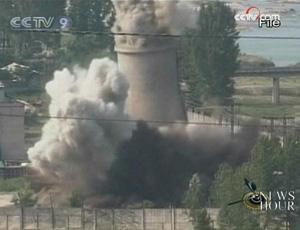There have been some encouraging signs on the development of denuclearization on the Korean peninsula.
 |
|
The DPRK says it will resume disabling its main nuclear complex, following the US announcement that it has removed Pyongyang from its list of state terrorism sponsors. |
The DPRK says it will resume disabling its main nuclear complex, following the US announcement that it has removed Pyongyang from its list of state terrorism sponsors.
The DPRK's gesture is raising hopes that the stalled six-party nuclear talks will be reactivated soon.
The US announced on Saturday that it was taking the DPRK off the list of state terrorism sponsors, as Pyongyang had accepted all of its nuclear inspection demands.
Hours after the announcement, the DPRK Foreign Ministry said it would restart disabling work at the Yongbyon nuclear complex and allow US and UN inspections at the site.
The weekend's developments have raised hopes that the staled six-party nuclear talks could quickly resume and also help improve US-DPRK ties.
But analysts have warned that more hurdles are likely to emerge. And they say there is still a long way to go before the complete dismantlement of the DPRK's nuclear program.
Pyongyang has said that prospects for the dismantlement depends on whether the removal from the list actually takes effect and the DPRK receives the international aid promised under the disarmament-for-aid deal.
US officials stressed that the DPRK could again be placed on the blacklist if it ends up not allowing the inspections.And they also said the next stage development should be within the six-party framework.
Sean Mccormack, Spokesman of US State Department, said, "The next step is living up to a key tenet to the six party talks, and that is, that an agreement between any two parties will ultimately be guaranteed and formalized by all the six parties."
The South Korean government welcomed the US decision, saying it hopes Pyongyang will return to the negotiation table soon.
Kim Sook, South Korean Nuclear Envoy, said, "This government welcomes these moves as an opportunity that would lead to the normalization of the six-party talks and North Korea's eventual abandonment of its nuclear programmes."
But Japan says the US decision is regrettable. The country has insisted that the six-party talks should also resolve the issue of the abduction of Japanese nationals by Pyongyang decades ago.
Shoichi Nakagawa, Japanese Finance Minister, said, "I don't think the United States properly consulted the Japanese government, its close ally, before making this decision. Its extremely regrettable. "
Japan has extended its economic sanctions on the DPRK for another six months.
(CCTV October 14, 2008)